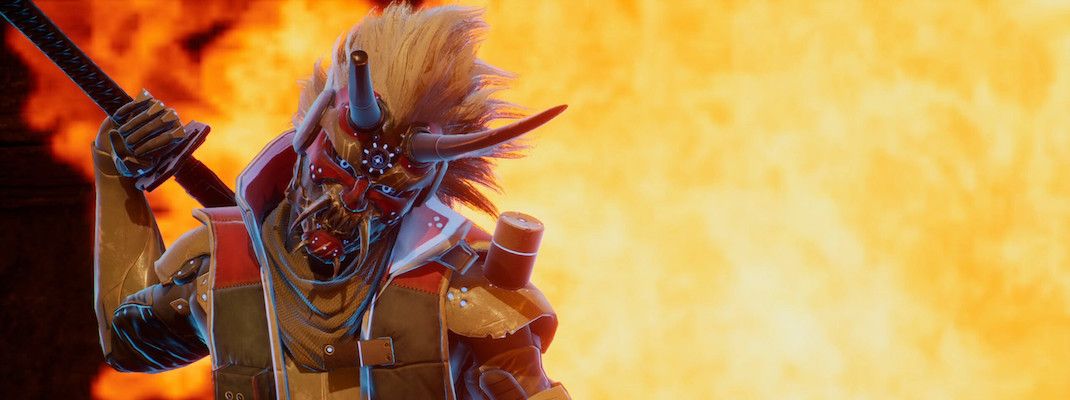The past decade has seen many action-platformers come and go, with few truly trying much new in the genre. That's not an altogether bad thing -- as it does give players a sense of immediate familiarity to a new game, but it does feel like the sub-genre has been stifled over the years. Blind Fate: Edo no Yami brings together both a feudal Japan and a post-modern cyberpunk Japanese setting while offering a blend of fast-paced and more strategic action. There's nothing else like it on the market and that's an impressive feat for a genre that has had so many entries in recent years.
Yami is a samurai revived to battle the yokai, but blinded and reliant on his other senses to thrive. The lack of vision forces him to strength his other senses and the less he has to work with, the better he will do in more advanced combat and that situation applies to the player in a few different ways. While the player can generally see the world around them, there are times when that isn't the case and unlike every other game on the market, your other senses in the real-world also help out in the game world as your own vision of the game can be obscured.
While the player will generally have a reasonably lit view to work with in a side-scrolling perspective, there are times when you are in darkness and have a minimal outline of a foe to work with based on the sense you choose, which is a fascinating approach. The heat sensor allows you to detect areas you can move to and from alongside a heat trail from an enemy. Sometimes, an enemy won't have a heat trail -- in which case, you may have to use the sense of smell. This comes in the form of smelling the blood and tracing it to the source -- so if a foe has rampaged through an area and left a body trail, you can follow that trail to them and take them out.
It's a cool concept and one that blends in nicely with the combat, as you can finish foes off with slick finishers that mix in both a sense and a stick movement alongside a button price to deal massive damage. There are also QTE finishers available and in the case of both, other enemies can't interrupt once they're started. It's clear that a lot of care went into the combat, which has a fair amount of variety to it that adds depth over time. Players can hack and slack and then dash through to not only avoid damage, but take out enemies. Dashing allows for faster platforming and movement throughout the non-combat areas as well.
There's a lot of variety within stages to blend in platforming and then some action. It's a bit like Strider 2 in that regard where you have closed-off areas, a slick cyberpunk-infused Japan, but the flow of combat is completely different. Strider is all-action and there's more of a stop and start flow to things here due to the different senses being involved. Blind Fate still does a fine job scratching the itch for an action-platformer -- but will disappoint those wanting something that's all-action. Thankfully, the blend of fast action and slower-pace does allow the player to have a bit of a break from button-mashing in regular battles and then especially in boss battles.
There, the mix of offense and defense comes into play even more. Some boss battles evoke Shadow of the Colossus by having you work to get to a weak point and then hammer that down before doing more generalized damage. The flow of combat is natural and made better by strong animation work across the board. Both you and your enemies have slick animation and that allows timing attacks and counters to be done easier than in many games.
Blind Fate's graphics, however, are an interesting mix of good and oddly bad in ways that haven't been seen before. The characters all look good and things like neon effects throughout night-time environments are stunning. Similarly, forest areas look beautiful with nice foliage, but some parts of the world look odd. Many indoor and outdoor areas use fire effects, like flaming barrels or torches and in a bizarre-looking issue, none of these flames move at all. They're completely static images and it sticks out like a sore thumb. Thankfully, every other part of the visual design shines, but it seems odd to have this even be a problem to begin with.
Thankfully, Blind Fate's audio is across-the-board greatness. The soundtrack is exactly what it should be -- using woodland instruments that fit the Japanese setting, but blending in more of a rock sound to fit the cyberpunk-infused world. In a surprise for a platformer, the game also has full voice acting that keeps a robotic sound throughout much of it to fit the cybernetic characters, but does a fine job of pairing nicely with the motion comics used for some of the story to get character motivations across.
Closing Comments:
Blind Fate: Edo no Yami is a good game that's held back by a lack of polish. It has a diverse array of kinds of platforming action with a blend of swordplay, platforming and sense-based puzzle-solving, but it needs work when it comes to the visuals as they're inconsistent. Some parts look fantastic, like the animation and overall movement, while parts of the environment suffer from still images being used instead of objects being in motion. The soundtrack is excellent though and the voice acting hits the notes it needs to, making Blind Fate worth a look.




